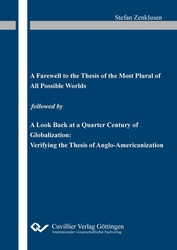| Areas | |
|---|---|
| Serie de libros (96) |
1381
|
| Nachhaltigkeit |
3
|
| Gesundheitswesen |
1
|
| Letra |
2370
|
| Medienwissenschaften | 16 |
| Teología | 57 |
| Filosofía | 102 |
| Derecho | 424 |
| Economía | 851 |
| Ciencias sociales | 418 |
| Ciencias del deporte | 48 |
| Psicología | 233 |
| Educación | 190 |
| Historia | 183 |
| Arte | 111 |
| Ciencias culturales | 166 |
| Literatur | 117 |
| Lingüística | 88 |
| Ciencias Naturales |
5408
|
| Ciencias Ingeniería |
1795
|
| General |
98
|
|
Leitlinien Unfallchirurgie
5. Auflage bestellen |
|
Erweiterte Suche
„A Farewell to the Thesis of the Most Plural of All Possible Worlds“ followed by „A Look Back at a Quarter Century of Globalization: Verifying the Thesis of Anglo-Americanization“ (Tienda española)
Stefan Zenklusen (Autor)Previo
Lectura de prueba, PDF (230 KB)
Indice, PDF (150 KB)
The first essay in this volume consists of a critical analysis of the findings of “pluralism” and “individualism” that have shaped scholarly opinion since the 1990s. Drawing on prototypical examples taken from the theoretical stock, it will be shown how brittle certain general theses are. The author demonstrates that the theses of pluralization and individualization are parts of an overarching and little-examined doxa, with a highly specific function of ideological and social pacification.
The second text is, as it were, the empirical complement to the first. Here it is a question of falsifying the discourse—predominant above all in the German-speaking world—according to which cultural globalization (in the broadest sense) is “transnational,” “hypercultural” (i.e. rootless), and represents an uncontrollable “métissage.” In each instance, this journalistic and academic grand narrative denies that Americanization is taking place.
On the basis of empirical facts, the author shows, in opposition to this, that despite the explosion of productive forces in the field of communications technology, globalization has a strong monocultural Anglo-Saxon bent. Both essays represent contributions to an epistemological rupture in globalization studies that has been overdue for almost 30 years, but that—in sociological and philosophical diagnoses of the times, and above all in neoconservative, German-speaking cultural studies—has been hindered by obstinate clinging to a myth.
| ISBN-13 (Impresion) | 9783736972735 |
| ISBN-13 (E-Book) | 9783736962736 |
| Formato | A5 |
| Idioma | Inglés |
| Numero de paginas | 100 |
| Laminacion de la cubierta | mate |
| Edicion | 1 |
| Lugar de publicacion | Göttingen |
| Fecha de publicacion | 16.09.2020 |
| Clasificacion simple | Libro de divulgacion |
| Area |
Filosofía
Ciencias culturales |
| Palabras claves | Stefan Zenklusen, Globalisierung, Globalization, Kulturelle Globalisierung, Cultural Globalization, Pluralismus, Pluralism, Grosse Erzählung des Pluralismus, Grand narratives of pluralization, Amerikanisierung, Americanization, Angelsächsischer Imperialismus, Anglo-american imperialism, Myth of pluralistic individualization, Mythos der pluralistischen Individualisierung, Transnationalismus, Transnationalism, Kulturelle Homogenisierung, Cultural Homogenization, Dekonstruktivismus, Deconstructivism, Neoliberalismus, Neoliberalism, Postfordismus, Post-Fordism, Risikogesellschaft, Risk society, Kulturelle Heterogenität, Cultural Heteregoneity, Glokalisierung, Glocalization, Postmodernismus, Postmodernism, Kritische Theorie, Critical Theory, Ideological function of the theses of cultural pluralization, Ideologische Funktion der kulturellen Pluralisierungsthesen, Oberflächliche Differenzen, Superficial differences, Frankophobie, Francophobia, Transnationalismus, Transnationalism, Ahistorical tendencies, Ahistorische Tendenzen, Individualisierung, Individualization, Poststrukturalismus, Post-Structuralism, Denglisch, Denglish, Cultural Studies, Kulturwissenschaften, Anglizismen, Anglicism, Monokulturalismus, Monoculturalism, Métissage, Hyperkulturalität, Hyperculturality, Hybridität, Hybridity, Antiamerikanismus, Anti-Americanism, Ulrich Beck, Zygmunt Bauman, Pierre Bourdieu, Loïc Wacquant, Lothar Baier, Theodor W. Adorno, Karl Marx, Ien Ang, Byung-Chul Han, Thomas Barfuss, Régis Debray, Pier-Paolo Pasolini, Rainer Winter, Hermann Lübbe, Jean-Philippe Mathy, Axel Honneth, Jean Baudrillard, Guy Debord, Jacques Derrida, Martin Heidegger, Michel Foucault, Gilles Deleuze |








